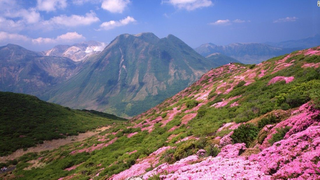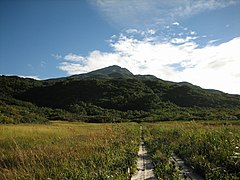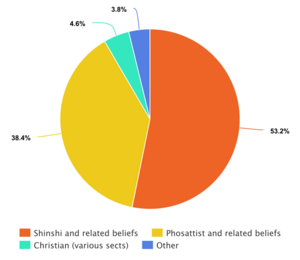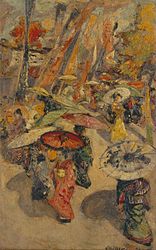Esonice: Difference between revisions
No edit summary |
No edit summary |
||
| Line 134: | Line 134: | ||
<gallery mode=packed caption="Esonian landscape"> | <gallery mode=packed caption="Esonian landscape"> | ||
File:Velian flower valley.png|200px|thumb|Mountainous landscape of inland Esonice, [[geography|Emisa]] | File:Velian flower valley.png|200px|thumb|Typical Mountainous subtropical landscape of inland Esonice, [[geography|Emisa]] | ||
File:Akita mt chokai.jpg|200x|thumb|[[Geography of Esonice|Kaishoji volcano]] in Kaishoji nature reserve in [[geography|Chiyashi]] | File:Akita mt chokai.jpg|200x|thumb|[[Geography of Esonice|Kaishoji volcano]] in Kaishoji nature reserve in [[geography|Chiyashi]] | ||
File:琵琶湖 マキノ町中庄 Lake Biwa - panoramio.jpg|200x|thumb|[[Geography of Esonice#Lakes|Lake Gamari]] is Esonice's largest lake and largest fresh water lake | File:琵琶湖 マキノ町中庄 Lake Biwa - panoramio.jpg|200x|thumb|[[Geography of Esonice#Lakes|Lake Gamari]] is Esonice's largest lake and largest fresh water lake | ||
Revision as of 15:01, 23 June 2022
This article is incomplete because it is pending further input from participants, or it is a work-in-progress by one author. Please comment on this article's talk page to share your input, comments and questions. Note: To contribute to this article, you may need to seek help from the author(s) of this page. |
Serene Kingdom of Esonice Esonya --Esonya-- | |
|---|---|
| Motto: "---" "We shall endure" | |
| Anthem: "Land of Flowers" | |
| Capital and largest city | |
| Official languages | Esonian |
| Recognised national languages | Esonian |
| Recognised regional languages | Velisian, Juraban, Alodian, Hirumese, Chiyashan, Kumikan, Emisan, Yatosan |
| Religion | Secular |
| Demonym(s) | Esonian |
| Government | Federal parliamentary constitutional monarchy |
• Serene Prince | Sanomi |
• Prime Minister | Aircho |
| Legislature | TBA |
| House of the lords | |
| House of the Commons | |
| Establishment | |
| Area | |
• | 354,835 km2 (137,003 sq mi) |
• Water (%) | 4.19 |
| Population | |
• 2021 estimate | 34,235,478 |
• Density | 95/km2 (246.0/sq mi) |
| GDP (PPP) | 2020 estimate |
• Total | $1.427 trillion |
• Per capita | $42,289 |
| GDP (nominal) | 2020 estimate |
• Total | $1.270 trillion |
• Per capita | $38,102 (10th) |
| Gini (2020) | 33.6 medium |
| HDI (2020) | very high |
| Currency | Esonian Zō (Ƶ) (ESO) |
| Time zone | UTC-8 |
| Date format | dd/mm/yy |
| Driving side | left |
| Calling code | +66 |
| ISO 3166 code | ES |
| Internet TLD | .es |
(This is very soon going to be changed) Esonice (Esonian: Esonya) offically the Serene Kingdom of Esonice (Esonian: ---) is an island nation located in Western Alharu part of the Esonian archipelago, surrounded by the Tiauhai Sea. The nation is also close to the giant Paran desert on mainland Alharu. Esonice does not have any immediate borders on land, but on its maritime borders its neighbours are the Andallan protectorate state of Giokto to the south, the Commonwealth of Andalla to the west, and island republics of Sushindo and Vikeda in the east. Esonice has a total of 257 islands in its territories; in total covering approximately 354,835km2 with a population density of less than 100 people per square kilometre. Its 3 main islands are the islands of Hirosho, Lisharishi and Mibiveshi. Other noticeable islands include Katomei, Shimishi, Zumaishi, Korado, Nanshi and Makoshi. Esonice's geographic terrain is mixed, ranging from the fertile sub-tropics in the eastern regions, to a semi-arid coastline surrounded by a lush tropical savannah in the north-western region - with both the eastern and western portions of the Hirosho island being separated, to an extent, by the Emisan mountain range. The islands are also known as large producers of unique varieties of tea and chocolate that can only be found on them. Various gemstones can also be found on the islands, such as emeralds, tiger eye and many different quartz such as rose quartz, including rarer gems such as hauyne and kornerupine created due to the high volcanic activity present in Esonice. Many pearls can also be found present on the Esonian coasts and much of the Esonian archipelago.
WIP
Esonice is classified as a high income developed nation, home to a population of 34,235,478 inhabitants, with its most populous city being Maimedo (Esonian: 橙京) with a population of 3,824,354 which also serves as the national capital, financial and cultural centre. Following the years after the Thalassan war, Esonice enjoyed an economic boom which lasted from the 1960s to the 1990s. Today Esonian citizens enjoy a high standard of living, alongside a free universal healthcare system, high standards of education, and economic freedom. Esonice has a vibrant cultural heritage, spanning from Esonice's renowned artistic scene, its cuisine, mythology, literature, music and popular culture in media, animation and gaming. Internationally, Esonice is an observer state to the League of Alharu and Aurelian Native Nations (otherwise known as LAANN), and the Entente of Oriental States (EOS). Esonice is also the current general secretary nation for the Group of Island Nations (GIN) and a member state of the Argic-Thalassan-Alharun Regional Association (otherwise known as ATARA).
Etymology
WIP
History
TBA
Geography
(OUTDATED)
---
- Esonian landscape
Typical Mountainous subtropical landscape of inland Esonice, Emisa
Kaishoji volcano in Kaishoji nature reserve in Chiyashi
Lake Gamari is Esonice's largest lake and largest fresh water lake
Climate and weather
---
Sandstorms can occur in Esonice when strong winds start blowing from the north-east from the Parans. Esonian monsoon season.
| Climate data for the nation of Esonice | |||||||||||||
|---|---|---|---|---|---|---|---|---|---|---|---|---|---|
| Month | Jan | Feb | Mar | Apr | May | Jun | Jul | Aug | Sep | Oct | Nov | Dec | Year |
| Record high °C (°F) | 29.5 (85.1) |
30.3 (86.5) |
32.2 (90.0) |
38.8 (101.8) |
42.8 (109.0) |
48.5 (119.3) |
44.9 (112.8) |
41.7 (107.1) |
39.2 (102.6) |
35.6 (96.1) |
32.3 (90.1) |
29.2 (84.6) |
48.5 (119.3) |
| Average high °C (°F) | 23.3 (73.9) |
24.6 (76.3) |
25.9 (78.6) |
26.8 (80.2) |
28.3 (82.9) |
33.2 (91.8) |
30.4 (86.7) |
28.1 (82.6) |
27.7 (81.9) |
26.6 (79.9) |
24.7 (76.5) |
23.5 (74.3) |
26.9 (80.5) |
| Daily mean °C (°F) | 21.7 (71.1) |
22.3 (72.1) |
21.3 (70.3) |
22.1 (71.8) |
23.6 (74.5) |
25.5 (77.9) |
24.6 (76.3) |
23.7 (74.7) |
22.3 (72.1) |
21.5 (70.7) |
20.8 (69.4) |
20.1 (68.2) |
22.5 (72.4) |
| Average low °C (°F) | 18.7 (65.7) |
19.7 (67.5) |
18.2 (64.8) |
19.3 (66.7) |
20.6 (69.1) |
21.3 (70.3) |
20.6 (69.1) |
20.3 (68.5) |
19.4 (66.9) |
18.5 (65.3) |
18.3 (64.9) |
17.1 (62.8) |
19.3 (66.8) |
| Record low °C (°F) | 11.4 (52.5) |
12.7 (54.9) |
13.5 (56.3) |
13.9 (57.0) |
14.2 (57.6) |
15.4 (59.7) |
14.3 (57.7) |
13.2 (55.8) |
13.4 (56.1) |
13.1 (55.6) |
12.5 (54.5) |
11.3 (52.3) |
11.3 (52.3) |
| Average precipitation mm (inches) | 102.1 (4.02) |
136.3 (5.37) |
173.6 (6.83) |
243.3 (9.58) |
324.8 (12.79) |
396.2 (15.60) |
432.3 (17.02) |
565.9 (22.28) |
334.2 (13.16) |
228.6 (9.00) |
216.4 (8.52) |
143.7 (5.66) |
3,297.4 (129.83) |
| Average rainfall mm (inches) | 44.2 (1.74) |
87.3 (3.44) |
134.2 (5.28) |
231.5 (9.11) |
324.8 (12.79) |
396.8 (15.62) |
432.3 (17.02) |
565.9 (22.28) |
293.2 (11.54) |
202.3 (7.96) |
164.4 (6.47) |
93.6 (3.69) |
2,970.5 (116.94) |
| Average rainy days (≥ 0.2 mm) | 7 | 12 | 15 | 18 | 19 | 20 | 23 | 25 | 20 | 18 | 17 | 13 | 207 |
| Average relative humidity (%) | 39 | 43 | 48 | 53 | 66 | 72 | 78 | 84 | 68 | 52 | 51 | 44 | 58 |
| Mean monthly sunshine hours | 253 | 294 | 302 | 275 | 258 | 244 | 205 | 198 | 260 | 280 | 253 | 233 | 3,055 |
| Mean daily sunshine hours | 9.2 | 13.2 | 17.2 | 16.2 | 12.4 | 10.5 | 6.3 | 3.2 | 11.2 | 10.2 | 9.6 | 8.4 | 10.6 |
| Mean daily daylight hours | 9.0 | 10.1 | 11.5 | 13.0 | 14.5 | 15.7 | 14.8 | 13.6 | 12.3 | 11.2 | 10.1 | 8.7 | 12.0 |
| Source 1: Esonian atmospheric science department (EASD) | |||||||||||||
| Source 2: Esostatics weather statistics | |||||||||||||
Biodiversity
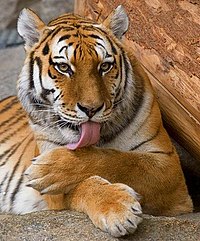
--- . A large government program has been put in place, converting many important areas of wildlife into nature reserves during the 80s and 90s in an attempt to end destruction of wildlife and illegal activities such as hunting. Also, many institutions have been formed to help endangered species on the islands. Many local authorities also started their own programs and regulations in an attempt to limit environmental damage.
Politics
WIP
Administrative divisions
WIP
Foreign Relations
Minister of foreign affairs: Mrs Yumi Kochi.
Law
TBA
Military
WIP
Economy
WIP
High end manufacturing of (electronics, machine parts) and the financial sector are the most important economic sectors to Esonice. Work in Progress
Finance
Work in progress
Energy
TBA
Manufacturing
Work in progress
Tourism
TBA
Entertainment and media
Work in progress
Agriculture and mining
Work in progress
Demographics
WIP
Esonice has a population of approximately 33,753,193, majority of which are nationals
| Rank | Name |
Region |
population |
|---|---|---|---|
| 1 | Maimedo | Velisia | 3,824,354 |
| 2 | Marusonya | Hirumi | 2,385,504 |
| 3 | Nando | Yatoshi | 1,743,231 |
| 4 | Rusonya | Hirumi | 1,432,104 |
| 5 | Seshu | Alodia | 1,384,284 |
| 6 | Sadeki | Velisia | 1,174,323 |
| 7 | Vikitsu | Chiyashi | 902,487 |
| 8 | Tamasu | Hirumi | 883,472 |
| 9 | Miyoto | Juraba | 673,274 |
| 10 | --- | Yatoshi | 544,384 |
Religion
WIP
According to the 2020 population census, 75.3% of Esonian citizens adhere to the indigenous Ari-kokai faith, otherwise known as Arikaism. About 21.5% of Esonians identify themselves as atheist or agnostic. It is often hard to find a precise percentage of Arikaist believers as it is decentralised faith with no holy book or religious figurehead. Arikaism is also closely interconnected with Esonice's cultural heritage, meaning that even though some Esonians identify as irreligious, they still may participate in many Arikai rituals, temple visits, celebrations, festivities as adherence to cultural traditions remains high. A significant Buddhist community also exists in Esonice, brought in by Huang merchants and migrants that came to Esonice throughout history and often influenced the culture of Esonice.
Ever since the introduction of Christianity to Esonice during the 17th century, many missionaries from places such as Tagmatium and Iverica came to Esonice trying to convert inhabitants. This left Esonice with a significant Christian minority of approximately 750,000 adherents, that make up 2.2% of the Esonian population. The majority Christian sect that is worshipped by the Esonian Christian minority is the Tacolic sect. Many individuals that identify themselves as Christian adherents are also migrants and non-Esonians, with the most significant being the Iberic communities of Esonice, specifically the Iverican community. Some Christian customs that were brought into Esonice by missionaries, migrants and Esonians converts, were partially adapted and secularised into Esonian society. Such as Valentine's Day that is thought of as similar to the Sun and moon festival, Christian-style marriage, and Christmas.
Other religions in Esonice include the Muslim faith, specifically the Ismaili Shia sect that makes up the majority of Muslim adherents in Alharu. The Muslim community in Esonice are primarily refugees that escaped persecution and systematic genocide from San Castellino, with little being ethnic Esonians. Only 2,850 out of the 40,000 existing Muslims identified themselves as ethnic Esonian Muslims in the 2020 population census. Only 32 mosques exist in Esonice.
Migrant communities
WIP
Languages
TBA
Culture
WIP
Art
WIP
Architecture
TBA
Mythology and Folklore
WIP
Festivals and holidays
TBA
Performing Arts
TBA
Literature and philosophy
TBA
Cuisine
WIP
Fashion
TBA
Music
WIP
Media
TBA
Sports
TBA
See also
Notes
TBA
References
TBA
External links
TBA


